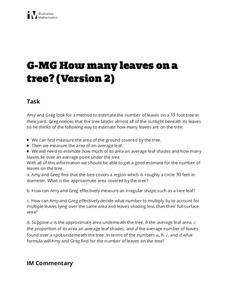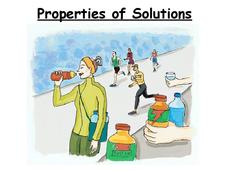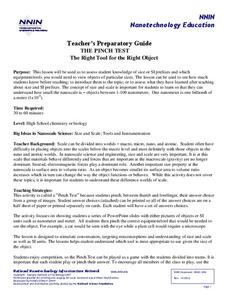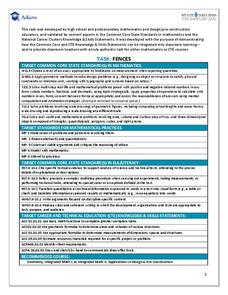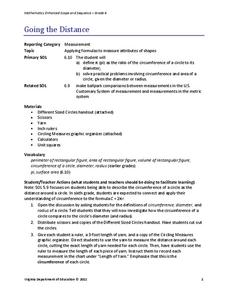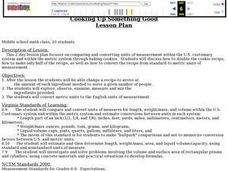Mathematics Vision Project
Module 5: Modeling with Geometry
Solids come in many shapes and sizes. Using geometry, scholars create two-dimensional cross-sections of various three-dimensional objects. They develop the lesson further by finding the volume of solids. The module then shifts to finding...
Balanced Assessment
Bumpy-Ness
Develop a new measure of the properties of an object. Scholars develop a definition and formula to measure the bumpy-ness of an object. They utilize their formulas to find the property for several spherical objects.
Noyce Foundation
Which is Bigger?
To take the longest path, go around—or was that go over? Class members measure scale drawings of a cylindrical vase to find the height and diameter. They calculate the actual height and circumference and determine which is larger.
Illustrative Mathematics
Lake Algae
Introduce learners to exponential growth with this real-world problem about algae that is rapidly spreading across a lake in a city park. The task presents the rate of growth and an end value and asks learners to determine what happened...
Charleston School District
Applications of the Pythagorean Theorem
Use patterns to your advantage! The Pythagorean Theorem allows learners to find missing sides of right triangles. Problems include those with both rational and irrational lengths.
Creative Educator
Dream Room Design
Junior designers brainstorm the elements that a bedroom might have, such as a bed, television, and dresser. They identify which items are needs and which are desires. They practice measurement skills in the classroom by determining its...
Mathematics Assessment Project
Designing 3d Products: Candy Cartons
Wouldn't it be great to work in a candy factory? Learners get their chance as they first design a carton for a candy that meets certain requirements. They then examine and analyze nets and explanations in sample student responses.
Teach Engineering
Aerogels in Action
Model an oil spill cleanup. An engaging engineering lesson has groups using aerogels to simulate an oil spill cleanup (vegetable oil in water). Along the way, they learn about nanotechnology and hydrophilia/hydrophobia.
Curated OER
Desert Plant Adaptations in the Sonoran Desert
Students are able to identify adaptations that plants have developed to deal with harsh desert conditions, as well as explain how these adaptations help to protect these plants.
Curated OER
Leaves: All-Natural Solar Collectors
Take a good look at tree leaves and notice the adaptations for collecting solar energy. Pupils trace the margins of five different leaves onto graph paper and count the number of squares covered. They then relate this infomation to the...
TryEngineering
Nano Waterproofing
Does your shirt hate water? In the activity, future engineers observe the hydrophobic effect in fabrics. They brainstorm and test some ideas for waterproofing fabrics.
Illustrative Mathematics
How Many Leaves on a Tree? (Version 2)
A second attack at figuring out the number of leaves on a tree, this activity makes both an excellent follow-up to version 1 and a stand-alone activity. Learners practice setting parameters and deciding acceptable estimate precision, and...
Science Geek
Reaction Kinetics
Show your classes the science behind rates of reactions with a presentation that explains factors that affect the rate, activation energies, exothermic and endothermic processes, and the proportionality of the product and reactant rates.
Science Geek
Properties of Solutions
Study the properties of solutions as they relate to mixtures. The slide show presents the key concepts involved with solutions including solvents, solutes, solubility, and electrolytes. Scholars learn the basics of the properties of...
Virginia Department of Education
Volume of a Rectangular Prism
Fill the minds of your young mathematicians. A hands-on activity has learners fill in a rectangular prism with unit cubes to determine its volume. the exercise provides a great hands-on way for learners to connect the activity to the...
National Nanotechnology Infrastructure Network
The Pinch Test
Test your pupils' understanding of the scale from macro to atomic. While displaying images of different materials, learners identify what they would need to make that material visible. Their choices range from the human eye to an...
Curated OER
Sinking Races
Students build plankton models and compete to see which sinks most slowly. They write, or orally present ,the adaptations they incorporated to slow the sinking rate of their organisms. Race results can be grounds for some prizes!
Curated OER
Biomes and Plant Growth
Seventh graders design four biomes models and plant three types of seeds in them to observe growth. In groups for each type of biome, they predict the seeds' growth in each of the settings. Students follow the conditions on a biome chart...
Achieve
Fences
Pupils design a fence for a backyard pool. Scholars develop a fence design based on given constraints, determine the amount of material they need, and calculate the cost of the project.
Virginia Department of Education
Going the Distance
Estimate the value of one of the most famous irrational numbers. The hands-on lesson plan instructs classmates to measure the circumference and diameters of circles using yarn. The ratio of these quantities defines pi.
National Nanotechnology Infrastructure Network
Silver and Bandages: Assessment of Inhibition of Bacteria by Silver Colloid-Impregnated Bandages
Silver: more than jewelry, it's also a natural antimicrobial agent. An inquiry-based lesson asks collaborative groups to design and implement an experiment to test this property. Using samples of silver nanoparticles and a strain of...
Teach Engineering
Design a Flying Machine
Wrap up the unit in one final design. Pairs use their knowledge of aviation to design new flying machines and record how their designs take into consideration the forces that act upon airplanes. The pupils determine whether their designs...
Curated OER
Cooking Up Something Good
Students compare and convert units of measurement within the United States customary system and within the metric system by baking cookies. Students discuss how to double the cookie recipe, how to make only half of the recipe, and how to...
Curated OER
Around the Clock
Middle schoolers discover the relationship between the circumference of a circle and its diameter. They find the length of an arc of a circle.Students use estimation strategies in real-world applications to predict results (i.e.,...
Other popular searches
- Surface Area and Volume
- Surface Area and Net
- Cylinder Surface Area
- Surface Area of Prisms
- Surface Area Volume
- Surface Area of Cylinders
- Finding Surface Area
- Surface Area Cone
- Surface Area Volume Cylinder
- Surface Area Lesson
- Cylinder Surface Area Nets
- Lateral Surface Area













